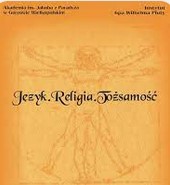Karawaka i synonimy, czyli o leksykalnych powrotach
Karawaka and synonyms, i.e. about lexical returns
Author(s): Anna Piotrowicz, Małgorzata Witaszek-SamborskaSubject(s): Lexis, Western Slavic Languages, Health and medicine and law
Published by: Akademia im. Jakuba z Paradyża
Keywords: lexicology; lexicogeraphy; the life of words; corpus research; the names of the cross protecting against the epidemic;
Summary/Abstract: The authors, referring to the article Words that come back by Bogdan Walczak from 1998, present the history of the word karawaka in Polish. It is the name of the cross with two horizontal beams protecting against various disasters, especially against epidemics. Originally, it was a reliquary from the 4th century AD with a piece of the Holy Cross Tree, brought in the 13th century during the Crusades from Jerusalem to the Spanish city of Caravaca (from which its name comes). The custom of erecting such crosses and wearing these types of small crosses disappeared in the 20th century, and returned with the SARS-CoV-2 coronavirus pandemic. The lexeme karawaka was recorded for the first time in Samuel Bogumił Linde’s Polish Language Dictionary, and in the Polish Language Dictionary edited by Witold Doroszewski it already had the status of historicism. This word and its synonyms (krzyż karawaka, krzyż choleryczny, krzyż epidemiczny, krzyż morowy, krzyż epidemiczny, krzyż choleryczny, krzyż karawaka) returned to Polish in 2020, and the lexical novelty during the SARS-CoV-2 coronavirus pandemic is krzyż pandemiczny.
Journal: Język. Religia. Tożsamość
- Issue Year: 27/2023
- Issue No: 1
- Page Range: 181-202
- Page Count: 22
- Language: Polish

